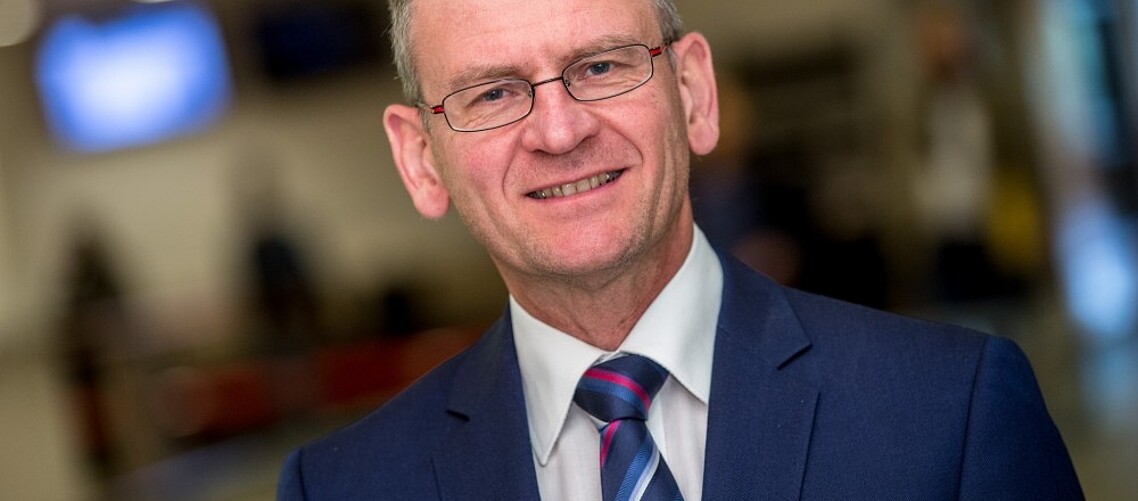When René de Koster embarked on his PhD some 30 years ago, he was one of a handful of academics conducting research into logistics optimisation. The field of logistics was in its nascent phase and the subject of material handling the focus of a select few academics worldwide.
Today logistics is a standard topic taught and researched in almost every business school in the world. Material handling has claimed its place within the field as an important research stream. While Prof. De Koster is quick to point out the many individuals who have contributed to its development, the extent of his own contribution to both fields is beyond question.
De Koster's name comes up as the author of the earliest dated published paper in the Netherlands on warehouse processes. Many academics in the field credit him as the driving force behind the emergence of the material handling field, going as far back as his PhD.
‘René’s pioneering work during his PhD spurred on many other researchers, including myself,’ says Professor Ivo Adan of Eindhoven University of Technology. ‘Since then, a huge body of literature has appeared on this topic leading to tools that have been successfully applied in many production environments.’
A passion for relevance
That logistics and material handling were such neglected areas of academic research within the Netherlands only 30 years ago still surprises Prof. De Koster. ‘A substantial part of the Netherland's gross domestic product is generated from material handling,’ he says. ‘Yet hardly anyone was studying or teaching it.’
Prof. De Koster determined to change that, but first he wanted to know the industry from a practitioner’s perspective. He spent seven years as a logistics consultant after completing his PhD, an experience that spurred a passion for industry relevance in research and teaching.
A great source of inspiration for him, he says, was Kevin Gue, now a professor at the University of Louisville in the US. ‘Kevin started the “personal impact index” for measuring the impact of research in practice,’ says Prof. De Koster. ‘I said, “Wow let's do that!”’
Soon after he joined RSM in 1995, De Koster started a course in Warehouse Management, the first of its kind at RSM. He encouraged his students to do internships in companies. Professor Iris F.A. Vis, a former PhD student of De Koster's, says: ‘René's emphasis on relevance continues to influence how I teach my own PhD students today.’
His approach to teaching won him awards – and continues to do so. In both 2013 and 2015, his students were winners of the Dutch Master’s Thesis prize and in 2014 of the Smartport thesis award.
In his research, Prof. De Koster collaborated extensively with the sector organisation BMWT as a means of connecting with industry. Over the coming decades he published 130 papers and eight books, winning numerous academic awards. His article on warehouse order picking (2007) is today the most cited article on the subject in the world.
One of his most important academic collaborations was with Prof. Yugang Yu, now executive dean at the University of Science and Technology of China, who describes De Koster as his ‘most important and inspiring research partner.’ Together they published 20 papers and worked on such high-profile projects as NWO VENI and KNAW-CAS. Another is Debjit Roy, an associate professor at the Indian Institute of Management in Ahmedabad, with whom he has published 15 academic papers.
Most of his projects have involved collaborations with companies, using their data and designing proposals for improvements. De Koster eventually formalised this interaction with the creation of the Material Handling Forum, a platform for the regular exchange of information between academics and practitioners and an initiative that has proven to be a game-changer in terms of opening communication channels between science and practice.
The ultimate virtuous circle
The highlights of his career, says Prof. De Koster, have been when his research has made an impact. A good example, he says, has been his research on warehouse safety in the Netherlands.
After being asked to chair Prize Safest Warehouse, Prof. De Koster initiated a large-scale research project that used data from dozens of companies to determine the most accurate criteria for evaluating leadership in warehouse safety. This method is now used by the Prize Safest Warehouse Awards.
‘From this research came the first way in which companies in the Netherlands could benchmark their warehouses in terms of safety,’ he says. ‘Today companies want to compete and participate in these awards. That's very rewarding, to see research go from practice to research to practice again.’
But Prof. De Koster remains humble about this achievement. ‘Let's say that I have been able to help a tiny little bit in making warehouses safer. I have a magazine in my hand now, saying that Dutch warehouses have the fewest accidents in the world. This is, in part, the result of this sort of thing, which makes me think, “Ah, we have achieved something”.’
The final word goes to RSM’s Dean, Prof. Steef van de Velde, who states categorically that: ‘Rene is by far the best Dutch professor in the broad area of logistics and supply chain – and one of the best world-wide. His accomplishments are amazing: he is widely published in the best academic papers, he is on editorial boards of the main journals in his area, his PhD students have found top positions in universities all around the globe, the impact that this work has on industry and society is exemplary, he excels at attracting external funding for his research, and he is extremely well connected and acknowledged, both in academia and practice. Moreover, he is a great RSM citizen and a role model for many.’
